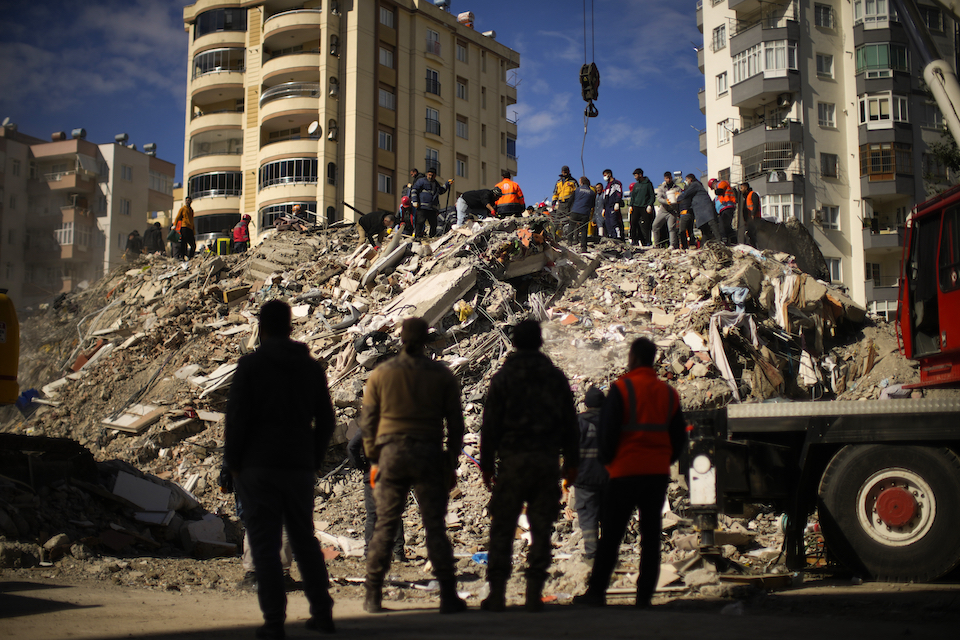
Turkey and Syria faced thousands of deaths and destruction of entire regions after an earthquake measuring 7.8 on the Richter scale struck the two countries early Monday morning.
This is the strongest earthquake in Turkey since 1999, when about 17,500 people died in the Turkish city of Izmit near Istanbul. While dozens of countries are now offering help and rescue teams are working around the clock to find survivors buried under the rubble, the country one man wants to appear to be in control of the business: President Recep Tayyip Erdogan.
It’s an election year and Erdogan has faced “the biggest challenge” since he came to power 20 years ago, first as prime minister and then as president, comments Carlos Santamaria in his GZERO analysis.
Failure to show up now, amid this large-scale natural disaster, could mean Erdogan’s political “death” in the May 14 elections.

“Chaos” turned Turks away from the mainstream parties, and in 2002 citizens flocked to the polls to vote for Erdogan’s then-new Justice and Development Party (AKP), which won the election and has remained in power ever since.
Diplomacy in the wake of the earthquake
The Turkish president now wants to present himself as managing the practicalities of the crisis. “It cannot afford to make mistakes, like in the summer of 2021, when the Erdogan government was unprepared to deal with the worst wildfires in Turkish history and initially ignored offers of international assistance.” writes Santamaria.
“The ruling party will benefit from a tough response to the crisis in the earthquake-affected areas, provided Erdogan is projected to maintain his momentum until the elections, not only with immediate assistance, but also with commitments to a long-term recovery,” Eurasia Group analyst estimates Emre Pecker.
Meanwhile, his opponents in parliament can’t stop him from scoring “political points” by manipulating disaster.
They have no place in opposition, Pecker adds. “The best thing they can do is mobilize to help and support the government’s efforts.” Otherwise, Erdogan will be able (perhaps cynically) to accuse them of politicizing the disaster.
It is expected that the Turkish leader will conduct his diplomatic “papers” more dynamically. Now he probably does not want to open more “fronts” with her. Sweden for an already “frozen” candidacy for NATO membership, or with an “eternal rival” Hellas for dominance in the eastern Mediterranean, and even with them Kurds fighters.
“The devastating earthquakes will give Erdogan a platform to engage positively with both allies and irritable neighbors,” Peker said. “Most likely, he will take advantage of the situation to strengthen a balanced position in his foreign policy.“.
Erdogan and Assad
However, the earthquake caused problems not only in Turkey. The quake devastated large areas of Syria, mostly held by rebels, where infrastructure had already fallen into disrepair from 11 years of civil war. Millions of internally displaced people live in squalid camps.
After a decade of supporting forces fighting Bashar al-Assad and four cross-border operations against Kurdish militants in northern Syria, Erdogan surprised many by saying he was ready to meet the Syrian leader in a peaceful setting.
Now that Assad’s army, backed by Iran and Russia, has recaptured much of the territory held by the resistance, both sides appear ready to accept what has been done on the ground and “look ahead.” It also helps that Erdogan and Assad have a mutual interest in containing the Syrian Kurds.
“Erdogan has already given the green light light for contacts with Syria under the auspices of Russia, in order to normalize relations with Damascus,” says Peker. The earthquake is “a convenient excuse for Ankara to accelerate these efforts leading to a summit meeting as Turkey and Syria show solidarity in the face of a humanitarian catastrophe.”
Source: Gzero
Source: Kathimerini
Anna White is a journalist at 247 News Reel, where she writes on world news and current events. She is known for her insightful analysis and compelling storytelling. Anna’s articles have been widely read and shared, earning her a reputation as a talented and respected journalist. She delivers in-depth and accurate understanding of the world’s most pressing issues.